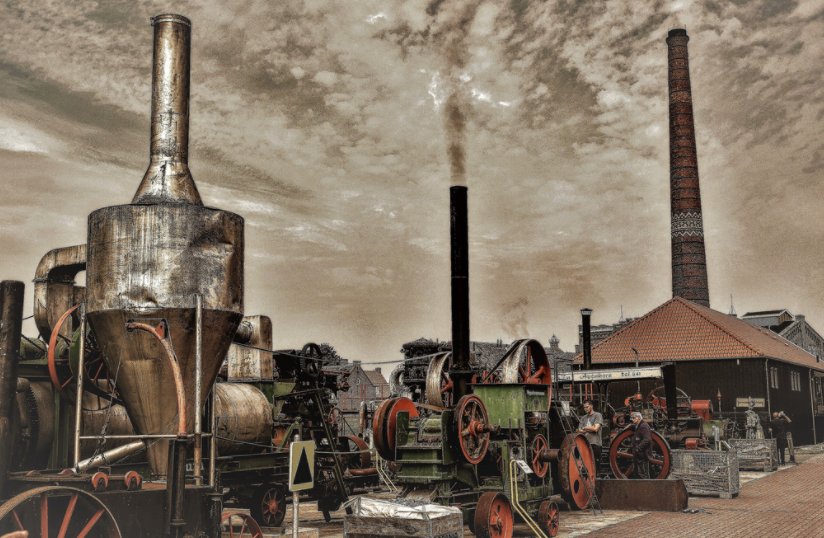Anthropocene - The Agricultural, Industrial Revolution & Great Acceleration

The scientific discourse about the beginning of the Anthropocene can be divided into three mayor time frames, starting with the Agricultural Revolution thousands of years ago, the Industrial Revolution around the 18th century and the ‘Great Acceleration’ and Nuclear Era during the mid-20th century.
Generally, geological periods are usually defined by distinct geochemical markers or significant changes in the fossil record conserved in ice cores or rocks (Foley et al. 2013). According to Zalasiewicz et al. (2011) the Anthropocene will leave clear markers, such as radionuclides, synthetic organic compounds, ocean acidification or sudden increase in CO² concentration. Therefore, according to Foley et al. (2013) the start of the Anthropocene can be dated back to 1780 AD which marks the beginning of immense increase in population growth, carbon emissions and CO2 levels in the atmosphere. However, Foley et al. (2013) argues that, anthropogenic environmental changes especially on local and regional level can be traced back much further.

Thus, they suggest the introduction of the term Paleoanthropocene as the period ranging from the beginning of human effects on the environment to the beginning of the Anthropocene. Similar to this approach also Ruddiman (2003) argues that the atmospheric concentration of CO² and CH4 gases already changed the atmospheric concentration thousands of years ago due to early agriculture and forest clearances. Also, Gowdy and Krall (2013) see the roots of the Anthropocene in population explosion caused by the agricultural revolution some 8000 years ago.
Contrary, Steffen et al (2015) identifies the beginning of the Anthropocene at 1950 during the “Great Acceleration” causing fundamental shifts in the state and functioning of Earth Systems, such as ocean acidification, carbon dioxide or terrestrial biosphere degradation. Steffen et al (2015) argue, that the beginning of the industrial revolution around the 18th century with its large scale use of fossil fuels will certainly leave its geological record. However, it is difficult to find evidence of a large-scale shift in Earth Systems before 1950. Also, Zalasiewicz et al. (2015) relates the beginning of Anthropocene in mid 21th century, more precisely in the year 1945 which marks the beginning of the nuclear age that led to the diffusion of artificial radionuclides worldwide.
References:
Gowdy, J., & Krall, L. (2013). The ultrasocial origin of the Anthropocene. Ecological Economics, 95, 137–147
Ruddiman, W. F. (2003). The Anthropogenic Greenhouse Era Began Thousands of Years Ago. Climatic Change, 61(3), 261–293.
Steffen, W., Broadgate, W., Deutsch, L., Gaffney, O., & Ludwig, C. (2015). The trajectory of the Anthropocene: The Great Acceleration. The Anthropocene Review, 2053019614564785.
Zalasiewicz, J., Waters, C. N., Williams, M., Barnosky, A. D., Cearreta, A., Crutzen, P., … Oreskes, N. (2015). When did the Anthropocene begin? A mid-twentieth century boundary level is stratigraphically optimal. Quaternary International.
Zalasiewicz, J., Williams, M., Fortey, R., Smith, A., Barry, T.L., Coe, A.L., Brown, P.R., Rawson, P.F., Gale, A., Gibbard, P., Gregory, F.J., Hounslow, M.W., Kerr, A.C., Pearson, P., Knox, R., Powell, J., Waters, C., Marshall, J., Oates, M., Stone, P., 2011. Stratigraphy of the Anthropocene. Philosophical Transactions of the Royal Society of London A 369, 1036–1055.
The problem of assigning a specific date for man's "causing fundamental shifts in the state and functioning of Earth Systems" is that the tools and methods we currently utilize for such endeavors are built upon cruder and less efficient tools of a previous era. I recall reading something from an old game "Sid Meier's Alpha Centauri" along the line of, we don't simply take a handful of sand and produce microchips; we make simple tools, which lead to ever-increasing complex tools and every iteration of this process must be followed.
The first instance of man harnessing fire was the moment of his realization that he can shape his surroundings by the force of will alone. One could argue that manipulation of fire was the germ of the conceptual framework that shapes our world-view today.
Good point. Without man's discovery and subsequent control of fire, there would be no further social and collective developments, especially in terms of domestication and sedentary life. There would certainly be no industrial revolution, let alone a Great Acceleration. Then again considering our warlike nature, it would have been an interesting development to see these counter trends.
Thanks for sharing :-) I am following. Please follow me
@fugetaboutit Steemit is gonna change lots of lifes, it has changed mine and many others but that is just the beginning. Followed